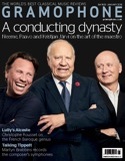Texte paru dans: / Appeared in: |
|
|
Outil de traduction (Très approximatif) |
|
|
Reviewer:
David Vickers Sonia Prina’s gentle singing in Silla’s sleepy ‘Dolce nume de’ mortali’ has sensitivity for the accompanying pair of recorders (Handel’s violin parts are almost completely missing in action), but in quicker arias she hits a few rough patches of aimless meandering when embellishing. Vivica Genaux navigates tricky coloratura splendidly as Lepido, whose lover Flavia is sung eloquently by Roberta Invernizzi (their voices do not mesh pleasingly in the duet ‘Sol per te, bell’idol mio’ – and Biondi gets their parts the wrong way around). Claudio’s bellicose ‘Con tromba guerriera’ with trumpets (not always perfectly in tune) and oboes is reinforced by additional thunderous timpani (rather too much of it); Martina Belli is overpowered at the expense of flamboyant dynamism. Francesca Lombardi Mazzuli’s smouldering Celia has feistiness galore but a tendency to catapult up the octave crassly at the ends of phrases. Sunhae Im’s rendition of Metella’s pastoral ‘Hai due vaghe pupillette’ skips along delightfully, although some groups of orchestral triplets played staccato instead of smoothly disturbs the musical mood for no good reason.
No
explanation is offered for why Biondi has substituted Handel’s four-movement
overture and the march that opens the first scene for different (uncredited)
pieces, nor why the Musette from Il pastor fido (1734 version) has been
added implausibly in Act 3. The climax of the final act is an elaborate
confection that owes almost nothing to what Handel actually wrote, and yet
Biondi cuts the essential reconciliatory duet for Silla and his long-suffering
wife Metella (the music does not survive but the printed libretto confirms that
it was obviously parodied from a duet in Rodrigo). Listeners might enjoy
Biondi’s sheen of vitality but much of what lies beneath the surface is
fundamentally flawed. |
|




